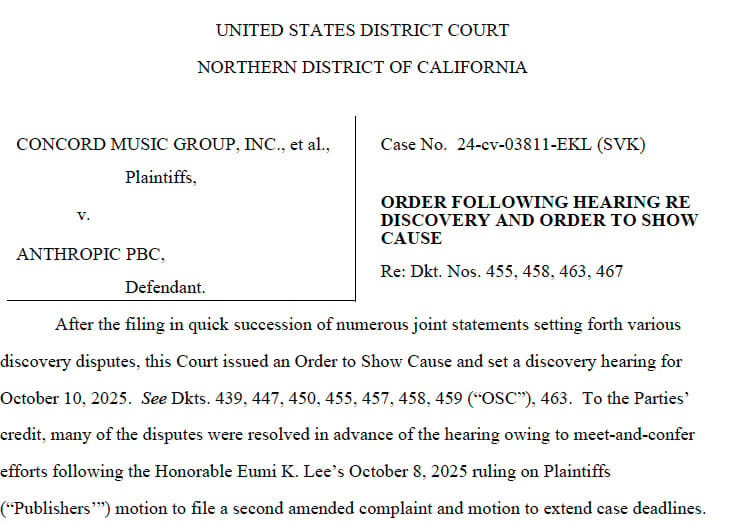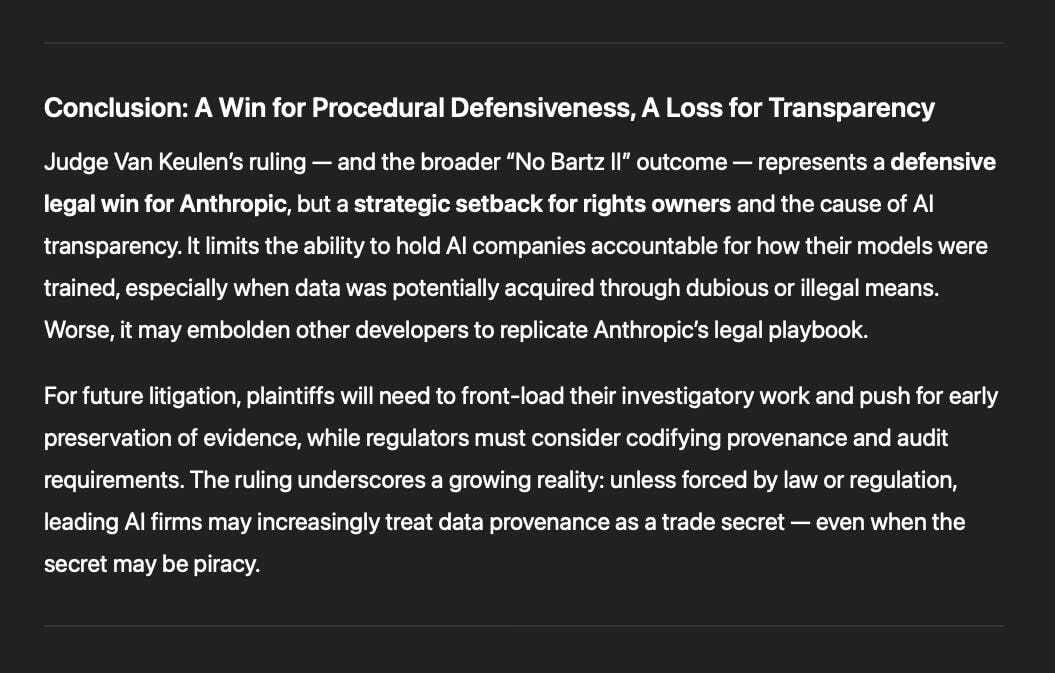- Pascal's Chatbot Q&As
- Posts
- GPT-4o: By prohibiting questions about how Anthropic obtained training datasets — including whether it engaged in torrenting or downloaded from shadow libraries — the court has erected a wall...
GPT-4o: By prohibiting questions about how Anthropic obtained training datasets — including whether it engaged in torrenting or downloaded from shadow libraries — the court has erected a wall...
...that prevents plaintiffs from fully investigating one of the most critical aspects of AI model training: source provenance. This limits the ability to prove willful infringement.
The Implications of Judge Van Keulen’s Order in Concord Music v. Anthropic
October 2025 Rulings on “Pirate Library” Allegations and Discovery Limitations
by ChatGPT-4o
Introduction
In a significant pre-trial development in Concord Music Group, Inc. v. Anthropic PBC, Magistrate Judge Susan van Keulen issued a detailed ruling that limits the scope of discovery, particularly barring Concord Music from questioning Anthropic employees about alleged use of BitTorrent and “pirate libraries” like LibGen or PiLiMi for AI model training. Judge Eumi Lee had earlier denied Concord’s request to amend its complaint to include these piracy-related allegations, effectively shutting the door on a “Bartz II”-style lawsuit, referencing Bartz v. Anthropic, a separate case where shadow library use had come under scrutiny.
This essay analyzes whether this ruling is a positive or negative development, its potential impact on future litigation involving Anthropic and other AI developers, and what it means for rights owners in other jurisdictions. It concludes with a forward-looking assessment of how such rulings will shape the AI litigation landscape.
Why This Is a Negative Development for Copyright Enforcement
At face value, the ruling may seem like a procedural skirmish over discovery boundaries, but its implications run much deeper:
Evidentiary Shielding of Potentially Incriminating Practices
By prohibiting questions about how Anthropic obtained training datasets — including whether it engaged in torrenting or downloaded from shadow libraries — the court has erected a wall that prevents plaintiffs from fully investigating one of the most critical aspects of AI model training: source provenance. This limits the ability to prove willful infringement, which is often a factor in calculating statutory damages or punitive awards.Incentivizing “Plausible Deniability”
The court’s deference to the scope of the First Amended Complaint (FAC) and Judge Lee’s prior ruling implicitly encourages AI developers to conceal controversial data sourcing practices early and thoroughly, knowing that if such practices are not uncovered before the complaint is filed, they may never be litigated.Foreclosing Future Claims Through Claim Preclusion
The companion article points out a looming issue: Concord may now be barred from bringing a future claim on the same issue under the doctrine of claim preclusion. This means even if new, compelling evidence of infringement via torrenting surfaces, the window for legal recourse may be permanently closed.Strategic Use of Guardrails to Shift Focus
The court granted Anthropic’s request to obtain statistical data from Concord regarding the number of prompts and responses that either triggered or bypassed Claude’s guardrails. While this seems like a balanced approach on its face, it subtly shifts the spotlight away from training data provenance to output control — potentially diminishing the scrutiny on upstream infringement.
Implications for Future Litigation Against Anthropic and Other AI Companies
The ruling sets a procedural precedent that other defendants may eagerly replicate:
Restricting Litigation Scope to Initial Complaints
By denying complaint amendments tied to newly discovered infringement pathways (e.g., via pirate libraries), courts signal that late-breaking revelations — even if credible — may be inadmissible if not thoroughly vetted and alleged at the outset.Segmentation of Discovery by Topic, Not Impact
This court bifurcated questions of dataset use (allowed) from dataset acquisition(mostly disallowed). Future defendants may exploit this segmentation, permitting limited transparency on downstream uses while stonewalling upstream liability for sourcing.Shielding AI Companies from Full Accountability
With plaintiffs denied access to deposition transcripts from related litigation (Bartz v. Anthropic), and with questions about BitTorrent practices off-limits, a roadmap emerges for other AI firms to limit exposure by narrowing discovery through strategic pre-trial motions.
What This Means for Rights Owners Outside the U.S.
The ruling has chilling ramifications globally, particularly in jurisdictions where copyright enforcement is already under strain:
Legal Fragmentation Across Borders
Countries like the Netherlands, Germany, Australia, and Japan — where unauthorized uploading/downloading is a criminal offense — may find themselves powerless to intervene if U.S. courts shield relevant data through procedural barriers.Precedent of Judicial Leniency for AI Innovators
Courts in jurisdictions observing U.S. trends may follow suit, especially if they perceive judicial hesitation to disrupt “innovation.” This can make it harder for local rights holders to mount effective challenges against global AI platforms.Encouraging “Piracy-Laundering” via U.S. Hosting
If courts prevent plaintiffs from even asking how datasets were acquired, companies training AI on infringing datasets can effectively “launder” these materials into commercial models that appear clean — especially if output guardrails function well enough to avoid detection.
Prediction for the Future: A Two-Track System of Enforcement
Unless courts or legislatures act swiftly, we are likely to see:
A Legal “Safe Harbor” for AI Builders
Companies that implement basic guardrails and limit the discoverability of their data sources may avoid serious liability, regardless of what content was used.Growth of Private Investigations and Regulatory Interventions
With civil discovery avenues narrowing, rights holders may rely more heavily on data scraping, whistleblowers, or international regulatory cooperation to uncover training data provenance — especially in the EU with the AI Act and DSM Directive provisions.A Push for New Legislative Carveouts or Mandated Transparency
Rights groups may lobby for laws requiring AI companies to disclose detailed training data provenance or maintain “data nutrition labels,” akin to supply chain disclosures in ESG regulation.
Conclusion: A Win for Procedural Defensiveness, A Loss for Transparency
Judge Van Keulen’s ruling — and the broader “No Bartz II” outcome — represents a defensive legal win for Anthropic, but a strategic setback for rights owners and the cause of AI transparency. It limits the ability to hold AI companies accountable for how their models were trained, especially when data was potentially acquired through dubious or illegal means. Worse, it may embolden other developers to replicate Anthropic’s legal playbook.
For future litigation, plaintiffs will need to front-load their investigatory work and push for early preservation of evidence, while regulators must consider codifying provenance and audit requirements. The ruling underscores a growing reality: unless forced by law or regulation, leading AI firms may increasingly treat data provenance as a trade secret — even when the secret may be piracy.

